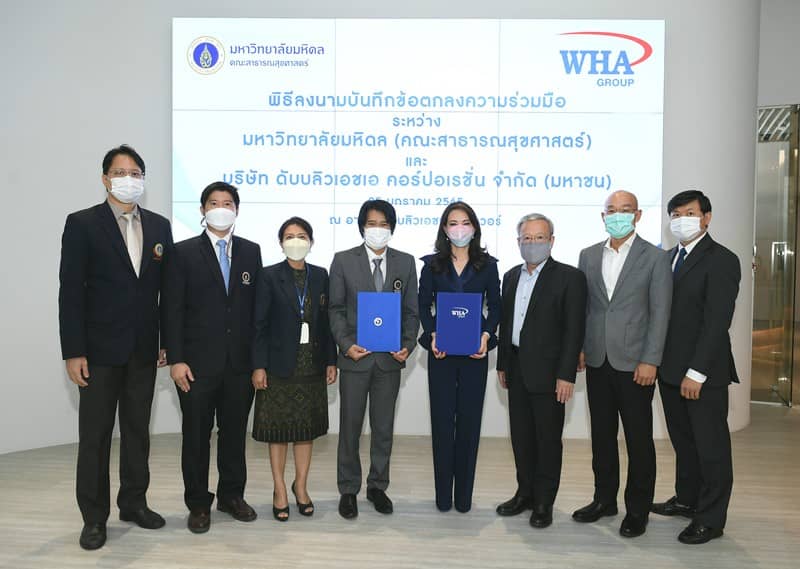公司新聞
WHA Group Signs MoU with Mahidol University Faculty of Public Health for Academic Cooperation on Wellness in Industry
26/01/2022
Shown in photo: Ms. Jareeporn Jarukornsakul (Center Right), Chairman and Group CEO of WHA Corporation PCL., and Assoc. Prof. Dr. Sarawut Thepanon (Center Left), Dean of Mahidol University School of Public Health were present during the signing of the collaboration agreement which was held at the WHA Headquarters, WHA Towers in Bangna.
Bangkok, January 26, 2022 – WHA Corporation PCL and Mahidol University, Faculty of Public Health, jointly announced the signing of a Memorandum of Understanding (MoU) for enhanced collaboration in the field of “Wellness and Industry”. The aim is to develop and promote an awareness and understanding of health and well-being in the industrial landscape, in order to develop a comprehensive curriculum for academic courses and training programs for students pursuing degrees in public health, and for professionals interested in industry development.
The collaboration was signed by Ms. Jareeporn Jarukornsakul, Chairman and Group CEO of WHA Corporation PCL., and Assoc. Prof. Dr. Sarawut Thepanon, Dean of Mahidol University School of Public Health during a ceremony attended by WHA executives and Mahidol faculty members.
Effective for 5 years, the MoU agreement is part of WHA Group’s initiative to provide a safe and healthy environment for factory workers and other employees in its logistics centers and industrial estates in Thailand. WHA pledges to support the research initiatives and development of training courses to be offered to university students as part of Mahidol University’s Faculty of Public Health curriculum for undergraduate and graduate students. The exchange of knowledge and information between the two institutions will enable a new generation of students, employees and future industry leaders to see health issues in the industrial workplace with a fresh outlook and provide them with the skills to solve problems and offer solutions that will benefit individuals, companies, society and the country.
For Mahidol University Faculty of Public Health, this collaboration will enable the creation of custom-built courses and programs focusing on workplace wellness and industry. Students will also benefit from value-added courses that will be offered following this MoU, and gain experience in real working environments. They will develop an awareness of existing practices and be able to transfer skills they learn in the classroom to the workplace and share what they observe in the workplace with their fellow students. ‘Next gen’ students are interested in studies that are profession-oriented and aligned with labor market needs.”
During the signing ceremony, Assoc. Prof. Dr. Sarawut, said: “This MoU represents a valuable opportunity for our Faculty to collaborate directly with the industrial sector, and we are proud to have WHA Group as our partner for this commendable project. WHA Group’s support, experience and insights will help us design and create learning and training programs that will add an exciting new dimension to our curriculum. This cooperation will also give our students the chance to observe local and international companies in Thailand’s Eastern Economic Corridor (EEC) and see the importance of health and well-being in an industrial environment. They will benefit from real-life experiences and see how wellness and industry can co-exist to achieve sustainable development goals.”
Ms Jareeporn said: “I am delighted to see new collaboration between the educational and industrial sectors. Signing this MoU with Mahidol University Faculty of Public Health, brings a lot of optimism to our industry in general, and to WHA in particular. At WHA, we aim to provide a healthy work environment in all our logistics centers and industrial estates, so this collaboration is in line with our corporate mission. Together we can raise awareness on health and wellness in the workplace, support the creation of academic courses that could help create new jobs and bring new energy, and introduce sustainable policies in the industrial sector that will help boost the economy.”

